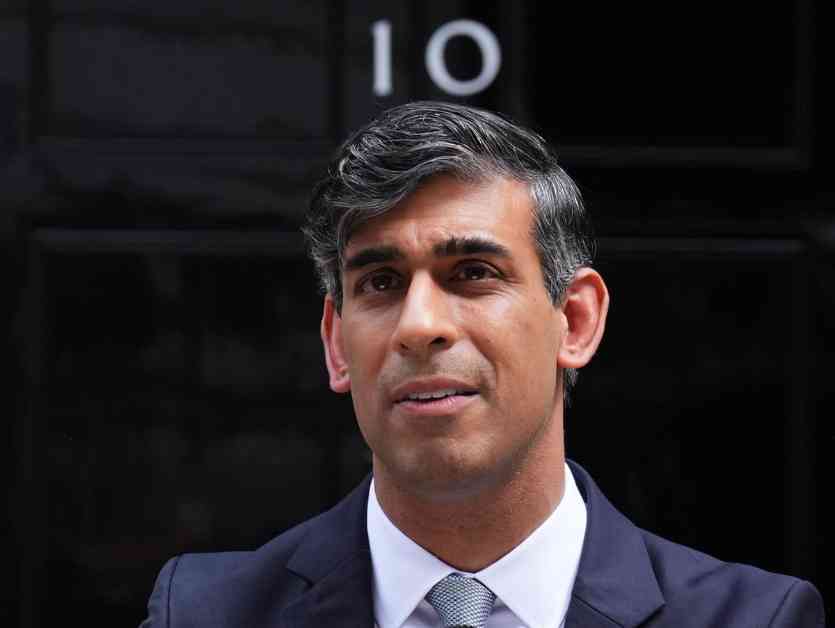Labour Government Cancels £40m Private Helicopter Service Used by Rishi Sunak
The Labour government has recently made the decision to cancel the £40 million private helicopter service that was favored by former Chancellor of the Exchequer, Rishi Sunak. The move was made in an effort to save taxpayers’ money and eliminate what was seen as a “grossly wasteful” contract. The decision to scrap the contract was made by Defence Secretary John Healey shortly after taking office, signaling a shift towards more responsible spending practices within the government.
The contract in question, which involved leasing two Augusta Westland helicopters from Sloane Helicopters, was initially reinstated by Mr. Sunak in 2023 after an initial decision to stop leasing the aircraft. However, the Labour government has now decided not to renew the contract, citing it as a symbol of the previous government’s extravagance and lack of fiscal responsibility. In addition to canceling the contract with Sloane Helicopters, the government has also axed another five-year contract related to VIP helicopter services.
According to a government source, the decision to cancel the contract was driven by a desire to move away from the previous government’s perceived wastefulness and disconnect from the realities facing ordinary citizens. The source stated, “The Tories’ VIP helicopter service became a symbol of their government: grossly wasteful, head in the clouds, and totally out of touch with the problems facing the rest of the country.” The decision to end the contract reflects the Labour government’s commitment to putting the needs of working people first and taking a more responsible approach to managing public finances.
The use of government-funded helicopters by politicians has been a contentious issue in recent years, with both Mr. Sunak and former Cabinet minister Grant Shapps facing criticism for their frequent use of helicopter services. Critics have argued that the use of helicopters for trips that could have been easily made by train or car is extravagant and out of touch with the experiences of ordinary citizens. The decision to cancel the £40 million contract is seen as a step towards addressing these concerns and demonstrating a commitment to more transparent and accountable government spending.
Subheadings:
Challenges of Government Helicopter Use
Criticism of VIP Helicopter Services
Labour Government’s Fiscal Responsibility Measures
Challenges of Government Helicopter Use
The use of helicopters by government officials is not without its challenges, both in terms of cost and public perception. While helicopters can offer a convenient and efficient mode of transportation for high-ranking officials, the cost of operating and maintaining these aircraft can be significant. In the case of the £40 million contract canceled by the Labour government, the decision to end the service was driven in part by concerns about the high cost of leasing and operating private helicopters.
In addition to the financial costs associated with VIP helicopter services, there are also environmental considerations to take into account. Helicopters are known to be less fuel-efficient than other modes of transportation, such as trains or cars, and their use can contribute to carbon emissions and air pollution. The decision to cancel the contract with Sloane Helicopters reflects a broader commitment by the Labour government to prioritize sustainability and reduce the environmental impact of government operations.
Criticism of VIP Helicopter Services
The use of VIP helicopter services by politicians has long been a source of controversy and criticism. Critics argue that the frequent use of helicopters for relatively short trips is a wasteful use of taxpayers’ money and sends the wrong message about government priorities. In the case of Mr. Sunak and Mr. Shapps, both politicians faced backlash for their use of government-funded helicopters for trips that could have been easily made by alternative means of transportation.
The decision to cancel the £40 million contract for private helicopter services is likely to be welcomed by those who have been critical of the use of VIP helicopters by government officials. By ending the contract and opting for government-owned vehicles for official travel, the Labour government is signaling a commitment to more responsible and transparent use of public resources. This move is consistent with the government’s broader agenda of addressing issues of fiscal responsibility and accountability in government spending.
Labour Government’s Fiscal Responsibility Measures
The decision to cancel the £40 million private helicopter service is part of a broader effort by the Labour government to demonstrate fiscal responsibility and accountability in government spending. In his statement announcing the cancellation of the contract, Defence Secretary John Healey emphasized the need to prioritize the needs of working people and ensure that public funds are used wisely and efficiently. The move to end the contract with Sloane Helicopters is a clear signal that the government is committed to rooting out wasteful spending and taking a more responsible approach to managing public finances.
In addition to canceling the helicopter contract, the Labour government has also taken steps to address other areas of government spending that have been criticized for their extravagance and lack of transparency. These measures include a review of government contracts and procurement practices, as well as efforts to streamline government operations and eliminate unnecessary expenses. By taking these steps, the government is working to rebuild public trust and demonstrate its commitment to serving the interests of ordinary citizens.
Conclusion
The decision to cancel the £40 million private helicopter service used by Rishi Sunak is a significant step towards promoting fiscal responsibility and accountability in government spending. By ending the contract with Sloane Helicopters and opting for government-owned vehicles for official travel, the Labour government is sending a clear message that it is committed to prioritizing the needs of working people and using public funds wisely and efficiently. This move reflects a broader agenda of addressing issues of wasteful spending and shifting towards a more responsible and transparent approach to managing public finances.












